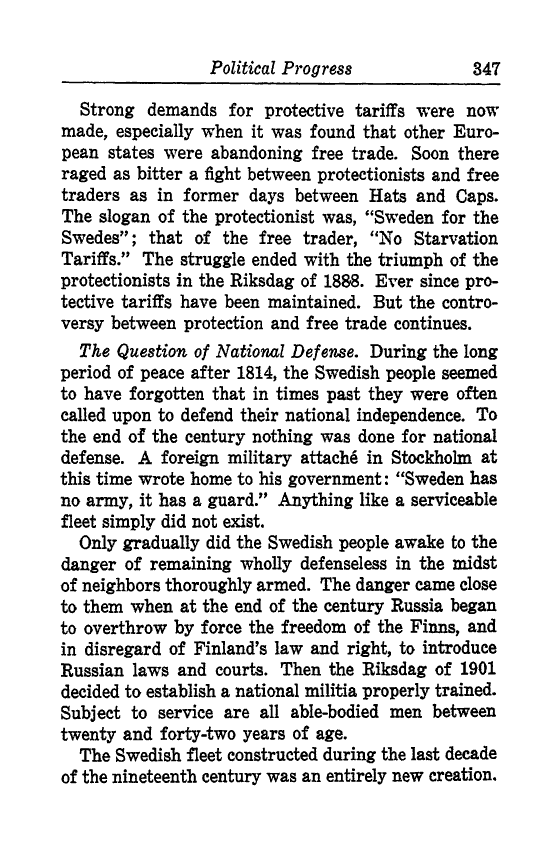
Full resolution (TIFF) - On this page / på denna sida - XXI. Political and Social Progress - B. Three Great Political Questions

<< prev. page << föreg. sida << >> nästa sida >> next page >>
Below is the raw OCR text
from the above scanned image.
Do you see an error? Proofread the page now!
Här nedan syns maskintolkade texten från faksimilbilden ovan.
Ser du något fel? Korrekturläs sidan nu!
This page has never been proofread. / Denna sida har aldrig korrekturlästs.
Political Progress 347
Strong demands for protective tariffs were now
made, especially when it was found that other Euro-
pean states were abandoning free trade. Soon there
raged as bitter a fight between protectionists and free
traders as in former days between Hats and Caps.
The slogan of the protectionist was, "Sweden for the
Swedes"; that of the free trader, "No Starvation
Tariffs." The struggle ended with the triumph of the
protectionists in the Riksdag of 1888. Ever since pro-
tective tariffs have been maintained. But the contro-
versy between protection and free trade continues.
The Question of National Defense. During the long
period of peace after 1814, the Swedish people seemed
to have forgotten that in times past they were often
called upon to defend their national independence. To
the end of the century nothing was done for national
defense. A foreign military attache in Stockholm at
this time wrote home to his government: "Sweden has
no army, it has a guard." Anything like a serviceable
fleet simply did not exist.
Only gradually did the Swedish people awake to the
danger of remaining wholly defenseless in the midst
of neighbors thoroughly armed. The danger came close
to them when at the end of the century Russia began
to overthrow by force the freedom of the Finns, and
in disregard of Finland’s law and right, to introduce
Russian laws and courts. Then the Riksdag of 1901
decided to establish a national militia properly trained.
Subject to service are all able-bodied men between
twenty and forty-two years of age.
The Swedish fleet constructed during the last decade
of the nineteenth century was an entirely new creation.
<< prev. page << föreg. sida << >> nästa sida >> next page >>